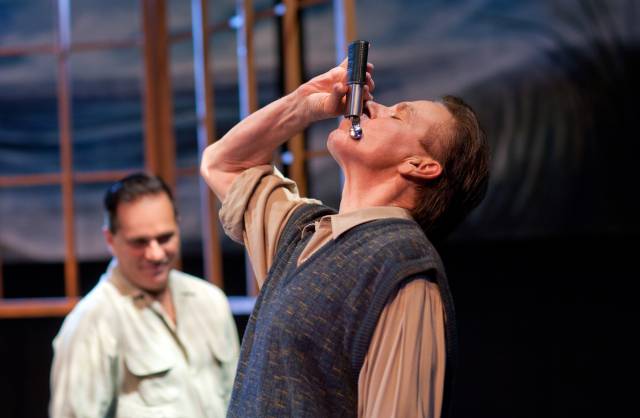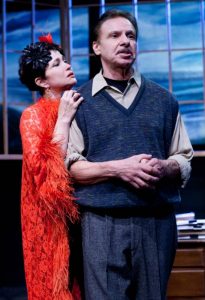

Penned by the late Jovanka Bach and directed/produced by her widower, John Stark, O’Neill’s Ghosts is a portrait of playwright Eugene O’Neill at the time he wrote his acknowledged masterwork, the largely autobiographical Long Day’s Journey into Night. As O’Neill (John DiFusco) makes visits to the well of memory to create his play, troubling spirits of the real-life models for his dramatis personae haunt him — and taunt him — mercilessly.
Bach’s play is no docudrama — and I don’t say that just because it depicts visible (and very verbal) apparitions. Bach took considerable liberties with the facts of the O’Neill biography. In her version of events, the writing of Long Day’s Journey coincides with the suicide of O’Neill’s son, “Bud” (Phil Donlon), who seems to be a composite of O’Neill’s real-life sons, Eugene, Jr. and Shane. Long Day’s Journey was written in the early 1940s, but Eugene, Jr. did not kill himself until 1950. (Shane later committed suicide as well, in 1977, more than a quarter century after his father’s death.)
The point Bach’s play is making is never quite evident, beyond that basic premise that digging deep during the creative process can reopen old wounds. Maybe a more nuanced production of her play could make Bach’s intentions clearer. This staging is an overheated affair, in which sturm, drang, and bellowed recriminations are piled on heavily.

Lisa Thayer plays O’Neill’s third wife, Carlotta, as a cartoonish study in vanity and affectation. Her approach is only an inch or so away from the manner of a Carol Burnett–style burlesque. Donlon stays restrained during the early part of the play, but toward the end has a prolonged gibbering breakdown scene that is mostly unintelligible. Mona Lee Wylde — who drifts through the drama as the shade of O’Neill’s morphine-addicted mother, Ella — has the perfect look for the part. But I knew the tone of the production was really off-kilter when the audience laughed at a line she uttered: “I need to go upstairs. I didn’t take enough.” In Long Day’s Journey, when matriarch Mary Tyrone delivers an equivalent line admitting her addiction, you may hear shudders or even gasps from the crowd. But you’ll not likely hear guffaws. As for DiFusco, he seems to be striving to stay relatively toned down. But while he bears a brooding physical resemblance to the real O’Neill, he doesn’t often seem truly haunted, only frustrated and put-upon.
On the plus side, Dana Kelly is effective as James, Eugene’s father — the theatrical patriarch. Kelly shows the man’s pride and haughtiness while hinting at his weakness and hypocrisy. The best thing of all about the production is the performance of Tom Groenwald as Jamie O’Neill, Eugene’s louche older brother. Disheveled and seedy looking, Groenwald snarls venomously and profanely one moment and then lapses into maudlin self-loathing the next. He would make a first-rate Jamie Tyrone in Long Day’s Journey into Night. I hope he gets to play that role sometime soon.